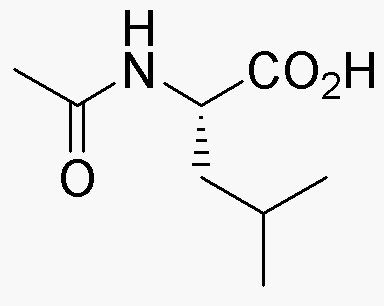Acetyl-L-leucine is widely utilized in research focused on:
- Neurological Disorders: It has shown potential in studies related to neurodegenerative diseases, helping to improve cognitive function and reduce symptoms in conditions like Alzheimer's.
- Muscle Recovery: Athletes and fitness enthusiasts use it to enhance muscle recovery post-exercise, as it aids in protein synthesis and reduces muscle fatigue.
- Dietary Supplements: This compound is incorporated into various dietary supplements aimed at improving overall health and well-being, particularly for those looking to boost their amino acid intake.
- Pharmaceuticals: It serves as an important building block in the synthesis of pharmaceuticals, contributing to the development of new medications with enhanced efficacy.
- Research on Protein Synthesis: Acetyl-L-leucine is frequently used in biochemical research to study protein synthesis mechanisms, providing insights that can lead to advancements in biotechnology.
General Information
Properties
Safety and Regulations
Applications
Acetyl-L-leucine is widely utilized in research focused on:
- Neurological Disorders: It has shown potential in studies related to neurodegenerative diseases, helping to improve cognitive function and reduce symptoms in conditions like Alzheimer's.
- Muscle Recovery: Athletes and fitness enthusiasts use it to enhance muscle recovery post-exercise, as it aids in protein synthesis and reduces muscle fatigue.
- Dietary Supplements: This compound is incorporated into various dietary supplements aimed at improving overall health and well-being, particularly for those looking to boost their amino acid intake.
- Pharmaceuticals: It serves as an important building block in the synthesis of pharmaceuticals, contributing to the development of new medications with enhanced efficacy.
- Research on Protein Synthesis: Acetyl-L-leucine is frequently used in biochemical research to study protein synthesis mechanisms, providing insights that can lead to advancements in biotechnology.
Documents
Safety Data Sheets (SDS)
The SDS provides comprehensive safety information on handling, storage, and disposal of the product.
Product Specification (PS)
The PS provides a comprehensive breakdown of the product’s properties, including chemical composition, physical state, purity, and storage requirements. It also details acceptable quality ranges and the product's intended applications.
Certificates of Analysis (COA)
Search for Certificates of Analysis (COA) by entering the products Lot Number. Lot and Batch Numbers can be found on a product’s label following the words ‘Lot’ or ‘Batch’.
*Catalog Number
*Lot Number
Certificates Of Origin (COO)
This COO confirms the country where the product was manufactured, and also details the materials and components used in it and whether it is derived from natural, synthetic, or other specific sources. This certificate may be required for customs, trade, and regulatory compliance.
*Catalog Number
*Lot Number
Safety Data Sheets (SDS)
The SDS provides comprehensive safety information on handling, storage, and disposal of the product.
DownloadProduct Specification (PS)
The PS provides a comprehensive breakdown of the product’s properties, including chemical composition, physical state, purity, and storage requirements. It also details acceptable quality ranges and the product's intended applications.
DownloadCertificates of Analysis (COA)
Search for Certificates of Analysis (COA) by entering the products Lot Number. Lot and Batch Numbers can be found on a product’s label following the words ‘Lot’ or ‘Batch’.
*Catalog Number
*Lot Number
Certificates Of Origin (COO)
This COO confirms the country where the product was manufactured, and also details the materials and components used in it and whether it is derived from natural, synthetic, or other specific sources. This certificate may be required for customs, trade, and regulatory compliance.


